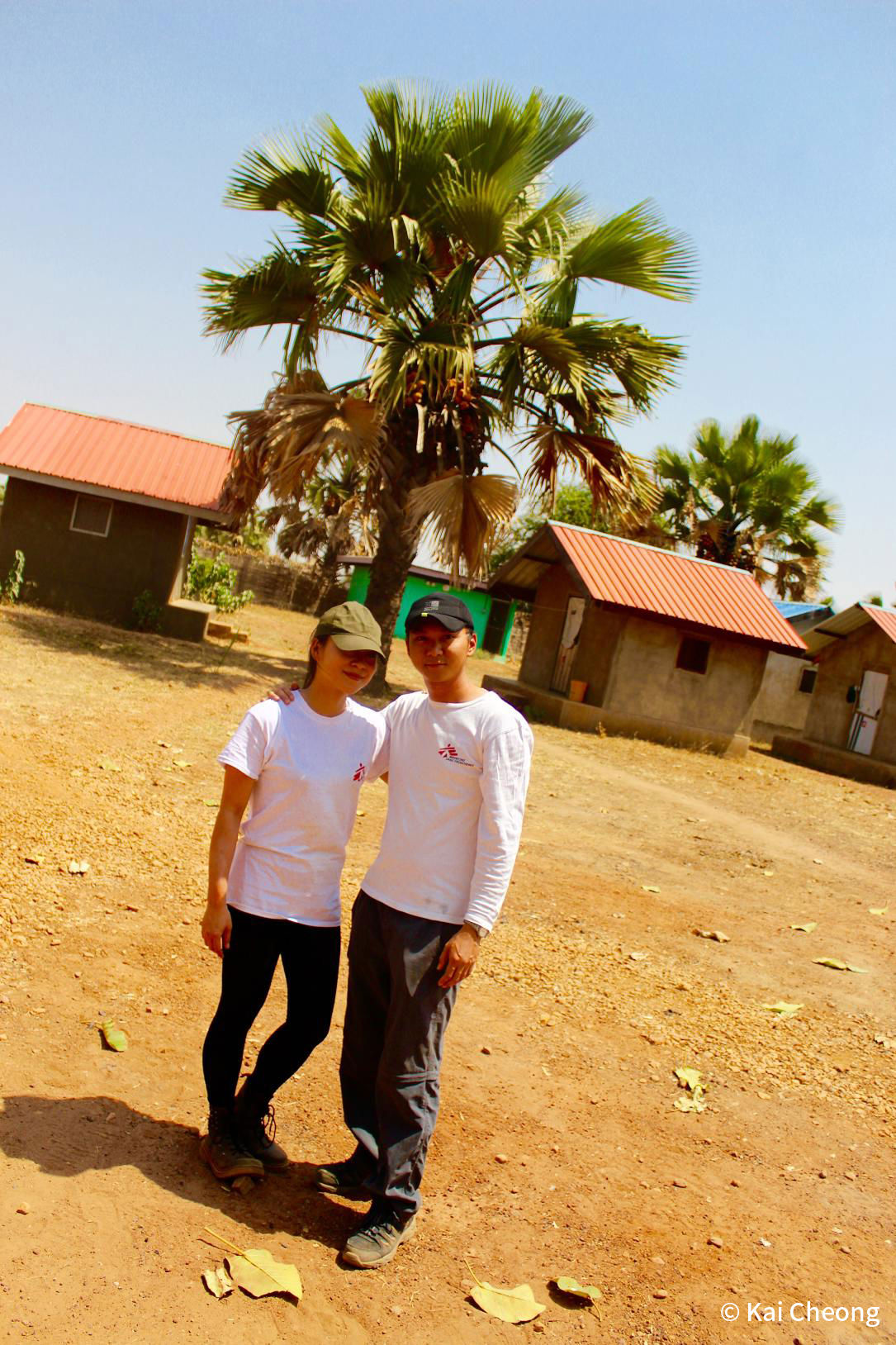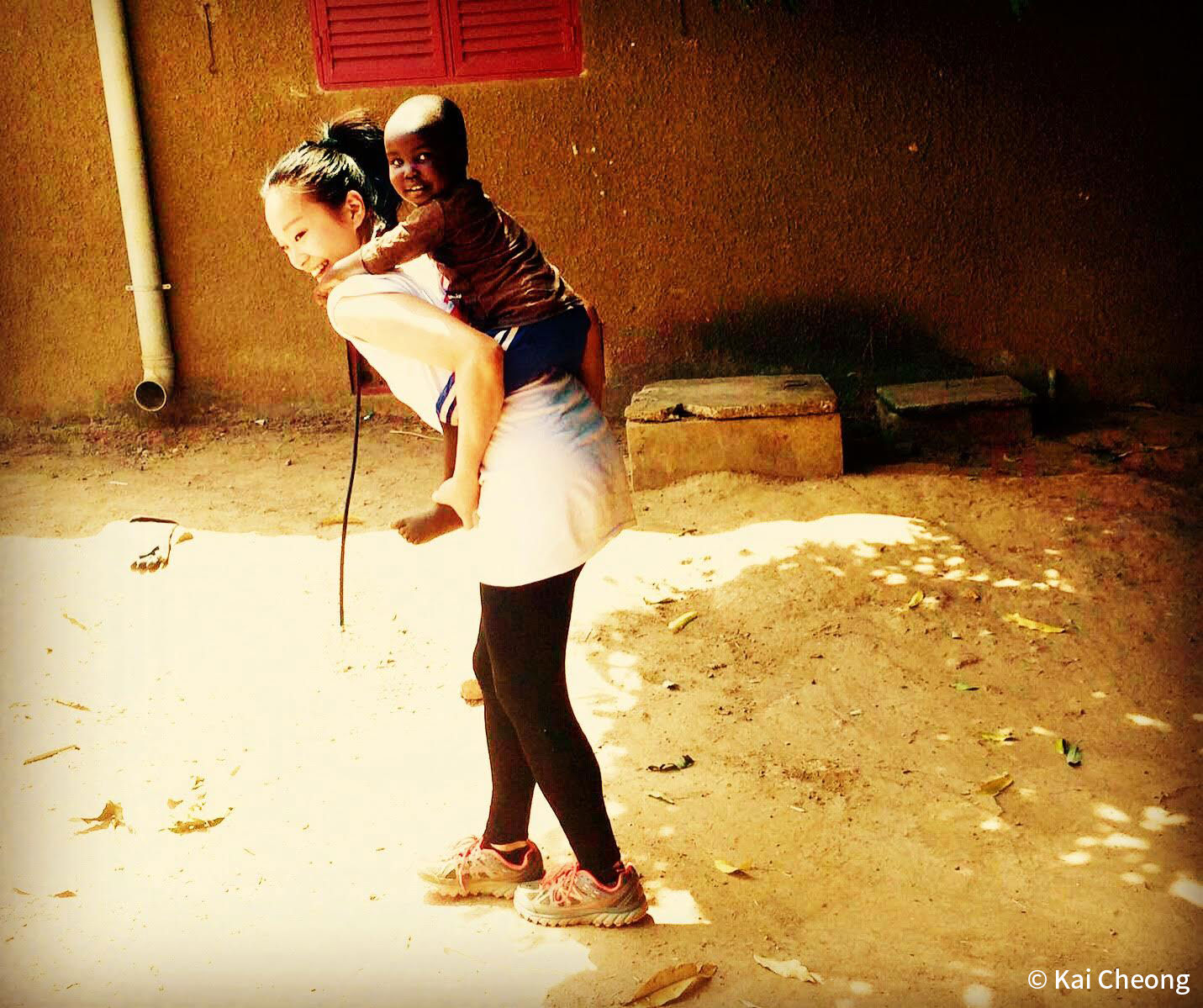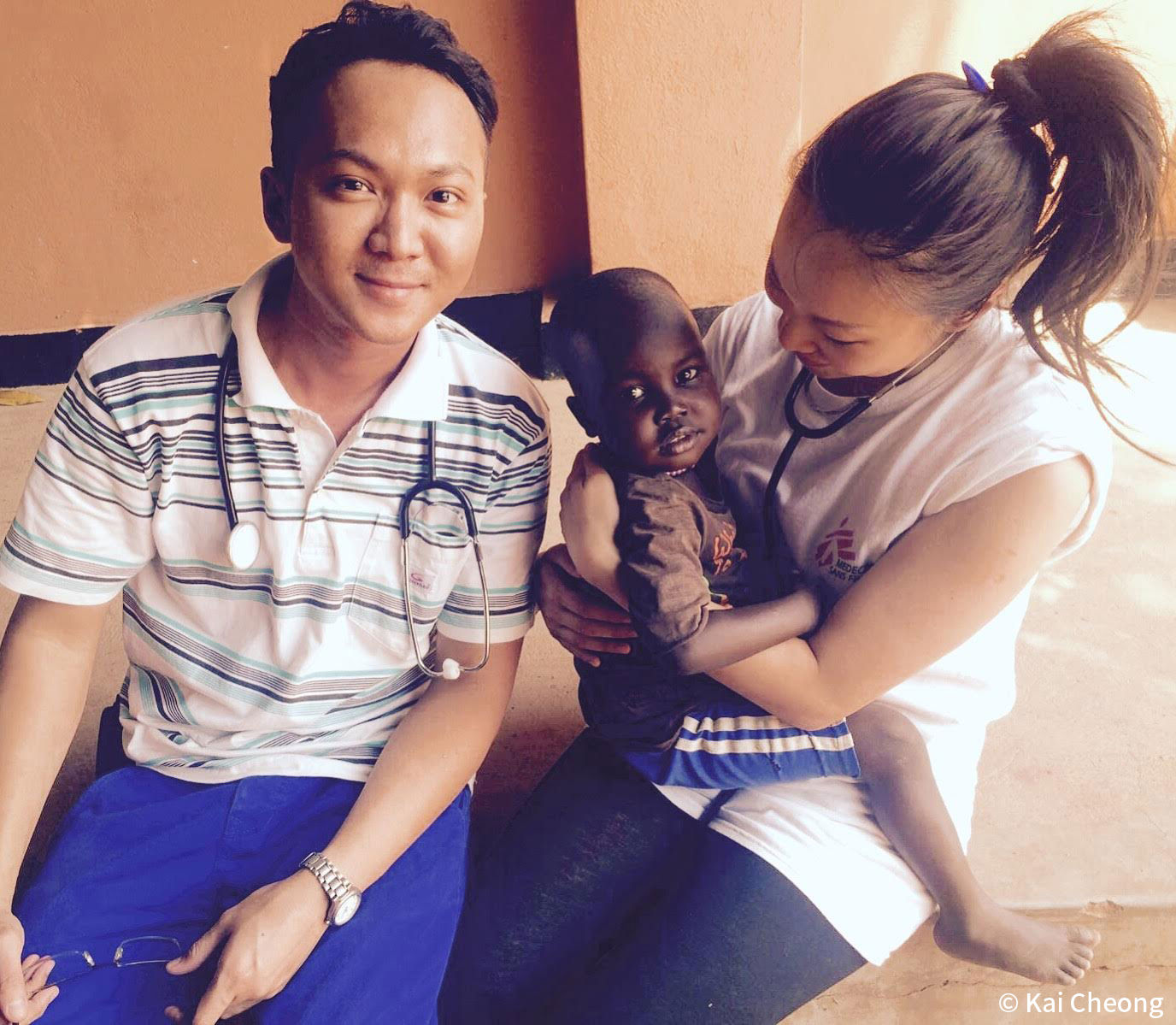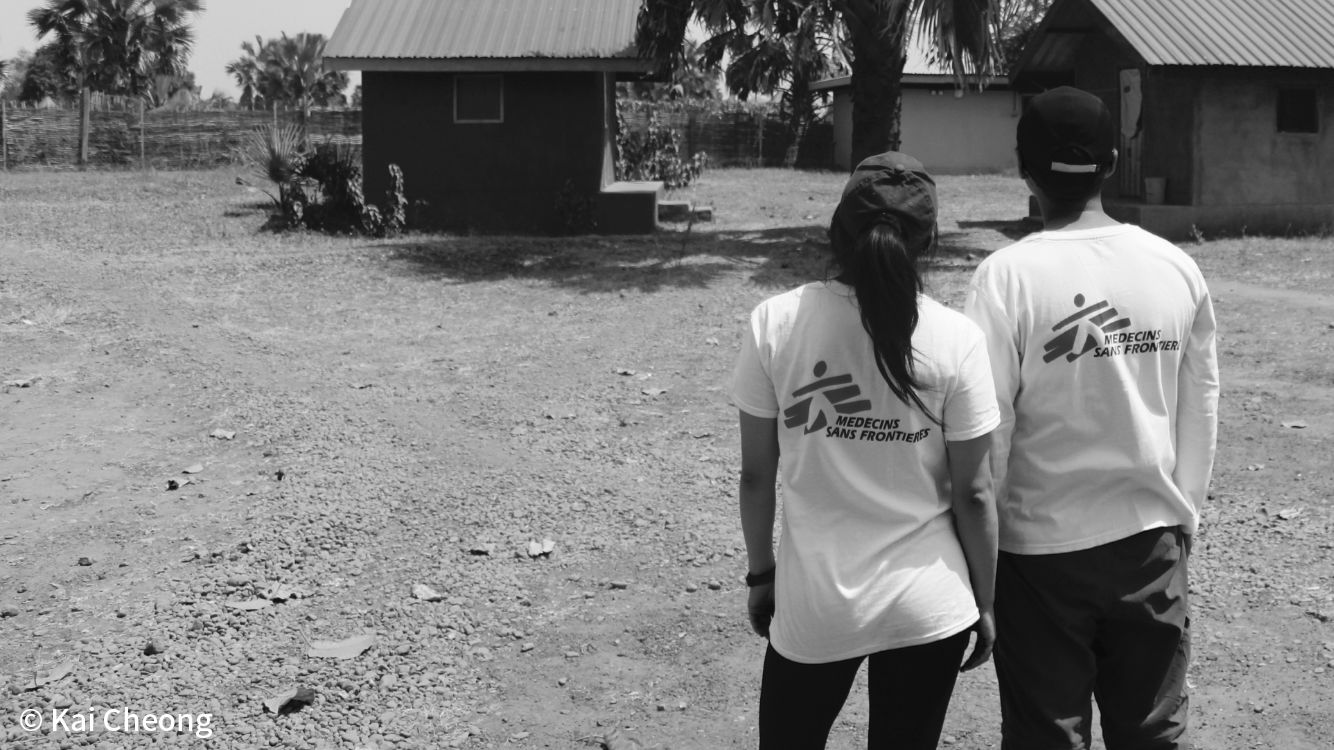(Continue of Gogrial - Paradise of kindness and brutality (1) ) As there are only two doctors, me and another Burmese physician Kyi, weekend rest days do not really exist.

One particular Sunday, I stroll jauntily towards the two buildings that function as our general paediatric and intensive care unit (ICU) wards, the obligatory walkie-talkie we use for communication bouncing against the heavy pockets of my cargo pants. The MSF flag with distinctive red logo flies proudly above our garage. I wave at the kitchen ladies collecting water from the faucet, dressed in their loose-fitting and long violet shifts, hair woven in delicate braids. Their weathered and stern faces break into amused toothy smiles as I call Chibak? (How are you today)? Shinkrei, they answer, I am doing well. I go through my morning salutations with our many watchmen, slapping our hands together with gusto in a hearty handshake, asking "Imphwol"? "Amphwol," they always answer, I am ok. Their weathered hands clutch mine in genuine camaraderie, as it is very important to greet each and every person in your community and ask after them. What a beautiful thing to start the day with so many smiles, and I try not to think about whether any of those hands has ever had to hold a gun.
But the peace of the morning is broken, the minute I step into a ward of wailing and hungry children.
I stop dead in my tracks. There are many things I see here that shock me, struggles that I feel I cannot contend with. This one nearly trumps them all.
"Daniel," I turn to one of our best nursing assistants with calm restraint.
"Why is there a - a GOAT in my paediatric ICU?"
The brown-and-white speckled goat in question, stares at me from behind the emergency medication trolley, and bleats once, balefully. I stare back menacingly, fisted hands on both hips. She doesn't budge.
"I will eat you," I proclaim imperiously, "I will call you Wendy, and we are very hungry. And tonight we will roast you and feast on your bones."
Wendy continues to look at me blankly but doesn't move, as Daniel shrugs and says, "Welcome to South Sudan".
Wendy is very stubborn, or as Daniel calls her, a "healthy goat" (apparently this only applies to animals, as no one has ever praised my health when trying to remove me from situations in which I stubbornly desist). After a very intense tug-of-war and an hour of sweaty effort we manage to remove this goat from my temple of medical care, and disinfect the ward from top to bottom.
Ward rounds are difficult and heartwrenching, when I do not even have basic investigations or even an x-ray machine. The children are so cachexic and wasted thin. Their families have walked for days to reach us in the blistering heat, and sometimes they arrive already dead. They suffer from severe malnutrition, pneumonia, severe malaria with coma, intestinal parasites. This is the first time I have seen so many cases of anthrax - the locals are tragically infected with the bacteria when forced to eat the meat of dead animals, as there is severe shortage of food in the dry season drought, and prices are skyrocketing with imminent economic collapse. The patients keep coming…The only tools I have are my clinical experience and my stethoscope, and there is heartbreakingly little I can do with only one oxygen concentrator, but we can treat most cases with simple antibiotics and anti-malarials, and strict milk feeding regimens. There is the occasional gunshot wound with shattered bone, and I panic at my surgical inexperience. We struggle to find an ambulance that can take the patient to Wau, 4 hours away and the only facility with an x-ray machine and a surgeon in the middle of the night, because of security concerns. Everything is rudimentary, and everything is constantly falling apart and needing fixing, and the Belgian expat midwife tells me, "this is MSF".
Everyday we struggle to do very much, with very little.
We can only temper the frustration, the inexperience, the suffering - by making the hollowed and haunted eyes of the mothers light up with our comic attempts to speak to them in the long dialect. Chiminingre? How is your baby. Ye thuat? How is the breastfeeding? Dek Piu? Is he drinking water? Yi laich? Watery diarrhea? Lo amath amath, ye abuthom. Patience, he will improve slowly, we continue the injections. Apath, mama. Good job, mama! We say encouragingly.


But the women are crippled with the same sense of helplessness as us, and when we say Ba la bai, he can go home! There isn't the normal sense of hope or joy at this prospect, that we usually see in parents in developed countries. This is a country where women have learned not to mourn their children, because so many are lost. Here both children and mothers eat 3 meals a day. Here their children are safe within these walls, here they are cared for. Here men must lay down their guns before they enter our compound. Here the children are more than soldiers bred for more war, and women are more than baby making factories. Here, they can finally be mothers, and human beings living with dignity.

A beautiful moment under the mango tree in a very painful week.
A severely malnourished child gaining weight and happy, a mother finally finding peace in South Sudan.
This country shatters your heart, and puts it back together again and again…
It is not a safe home we send these people to. We send them back to the endless cycle of poverty and malnutrition and disease and violence, dreading how soon they will come back again. Dreading how soon they will have nothing to come back to, when MSF closes this project in a few months and re-diverts resources to responding to critical emergencies. These people need education and development, but that has never been MSF's mandate, no much how insurmountable their needs and suffering are.
In the late afternoon, after a friendly game of football and pick-up basketball with the local staff under the pink and twilight-blue fire of an African sunset, we head back to our compound to gather under a giant Acacia tree for dinner. Previous mission staff erected a huge circular wooden structure surrounding it for shelter under its shade, a central focal point aptly named "Mosquito Bar" for the high risk of malaria one may be infected with sitting under it.



Without reliable wifi, without telephones, without television, without radio, we must entertain ourselves. Strong russian beer appears magically as we muse over the troubles of this broken country, slaking our thirst for a different kind of life we know is possible. Then the guitars, ukuleles and drums begin a cross-cultural immersion of sound, as the cats outside our kitchen yowl in unison. Pakistani staff regale us with songs of unrequited love in Urdu and Pashto, as our Nicaraguan drummer bangs out trance-like rhythms of memory and amnesia, captivating us before melting and fading into the long night.
The outside world intrudes momentarily. Massive UN trucks carrying food and supplies rumble over dirt roads on the other side of the fence. A wedding next door where a dowry of 300 cattle were presented to the village chieftain competes with us, ebullient singing and hypnotic drumming resonating through the early dawn hours. Our faces are lit with the fire of cigarettes and sad smiles, because the people here have so little to celebrate and be happy for. The unbearable heat of the day transforms into comfortable strong gusts of sweet breeze, bringing change and relief to our tired bodies and minds.
The ink-black night sky here is heavy with a woven quilt of billions of stars, layers upon layers of constellations, interlocking across dimensions of time and space and intensity and memory. I once loved a sailing man, who told me that Venus is the brightest star, but I must find the North Star to find my way home.
In the southern hemisphere here, every star here is brighter than the next. I feel lost, afloat in the dark celestial sea of light, disjointed and alienated from myself and everything I know. I am tens of thousands of miles away from home, in a forgotten place, a country without a moral compass; a land of fire and blood, of kindness and brutality. I used to say that you cannot make a home out of a person, but these South Sudanese are reminding me that perhaps the memory of our loved ones' voices, jarring and worried down terrible phone lines, are all that tie us to this earth. Communication is always cut short by a dying connection. I remember a baby that afternoon whom held a rattle carved from wood in the shape of a thigh bone, ringed in tiny tribal beads, in memory of her dead twin sister. She must carry this with her always, or she loses herself.
The stories weave themselves into the song of the wind, and we struggle to sleep. Seeds of hope and loss have been planted in the garden of our souls, and we toss and turn, waiting for the rains to finally come.
(The end)


